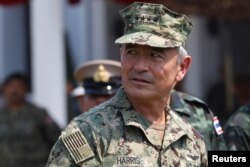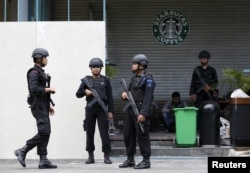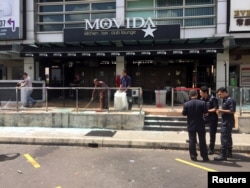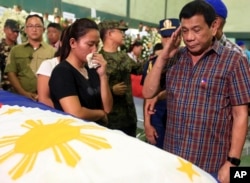The United Nations says Southeast Asia needs to put in place a comprehensive regional plan to combat a rising threat of violent extremism as Asian fighters return home from Iraq and Syria.
The call by the UN’s Office of Drugs and Crime (UNODC) is set amid fears of growing cooperation between Islamist extremist groups, al-Qaida and the so-called Islamic State (IS) members in the region.
Jeremy Douglas, the UNODC Asia regional representative, said while Southeast Asian countries have improved collaboration and intelligence sharing, measures are ad hoc and inconsistent, especially in dealing with fighters returning from the Middle East.
Unified policy against terror
“The region itself doesn’t have a strategy to deal with [foreign fighters]. There’s some strategies at a national level to an extent but they are very inconsistent across the region, and the region itself doesn’t have a strategy to deal with this phenomenon,” Douglas told VOA.
He said it was important for ASEAN to develop a regional prevention of violent extremism plan that is subsequently tailored for each country.
The UNODC’s call comes as the Commander of the U.S. Pacific Command, Admiral Harry Harris, added his concerns that the Asia Pacific faced a growing risk of attacks by IS group fighters returning to their home countries.
Warning from US admiral
“It’s not a theory. It’s real,” Harris told a recent conference in New Delhi. “In the past year alone ISIL [IS] had made its murderous intentions clear in places like Bangladesh, Indonesia, the Philippines, and the United States,” he said.
Analysts say estimates of Asian fighters in the Middle East are around 1,000.
Authorities have succeeded in preventing others from traveling, bound for Syria and Iraq. But often fighters will journey to several countries before traveling to Turkey to avoid detection.
Terror arrests on the increase
In the past year the UNODC says Indonesian arrests and deaths of terrorist suspects “more than doubled” to 170.
But signs of the threat are still there. In January 2016, an attack in Jakarta was said to be the first IS assault with a suicide bombing that led to the deaths of four attackers and four civilians.
In July, an attack on a restaurant in Bangladesh by IS left more than 20 people dead.
Also in July a grenade attack at a nightspot in Kuala Lumpur’s Puchong district left eight people injured amid warnings of further attacks.
While some reports blamed the attacks on local gangsters, Malaysian authorities arrested 15 people, including two policemen accused of providing support to IS elements.
Authorities claimed the attack was carried out on orders of Muhammad Wanndy Mohamed Jedi, a Malaysian Islamic State fighter in Syria.
Support for terror groups is significant
The Jakarta-based Institute for Policy Analysis noted in a 2016 report, support for ISIS had deepened cooperation among extremist in maritime Southeast Asia, “making it more important than ever for law enforcement agencies to have expertise on groups outside their own borders.”
The report said specific attention is needed to focus on the Philippine region of Mindanao, especially among pro-IS groups with links elsewhere in the region.
These groups included the Basilan-based faction of the Abu Sayyaf Group (ASG); Ansarul Khilafa Philippines (AKP); the Maute group in Lanar del Sur and Bangsamoro Islamic Freedom Fighters (BIFF).
There may be an increase in militants coming to the region
Thitinan Pongsudhirak, a political scientist at Chulalongkorn University in Thailand, said military defeats in Syria and Iraq will lead IS fighters from Southeast Asia to return to the region.
“They will start to conduct their operations elsewhere. This will be home grown self-help, lone wolf, — you’ll see more of that. At the same time the organized fighters will return to their countries, including Southeast Asia,” Thitinan told VOA.
“This means that South East Asia will have to be ready and brace themselves for potential terrorist violence looking forward,” he said.
Past experience with terror
But Thitinan said Southeast Asia needs to draw on past experience in dealing with the threat posed by the Islamist terror group Jemaah Islamiyah (JI) over a decade ago.
“Overall, ASEAN has dealt with this before — with the Jemaah Isalmiyah and it was largely successful. Indonesia in particular. But overall the handling of the terrorist violence has been more individual country based — each country for itself rather than ASEAN wide efforts,” he said.
Southeast Asian nations were galvanized after JI’s deadly attacks, including 2002 bomb attacks on Indonesia’s Bali island, which killed more than 200.
These were followed by JI linked bombings in 2003 at the JW Marriott Hotel in Jakarta and the 2004 Australian Embassy bombing, also in the Indonesian capital.
“[But] this round will be interesting because ASEAN is more divided now,” said Thitinan, with countries faced with new leaderships and differing interests.
Human rights lawyer and author Banjamin Zawacki agrees that cross regional cooperation may be a challenge.
“It is going to be difficult for Southeast Asian countries to come up with a collective policy to which all 10 countries [of ASEAN] are going to agree, because ISIS (IS) is so new,” Zawacki said.
“Everyone still sees the region — as does the U.S. — sees the region and sees the various insurgents in the region as independent entities into which they hope ISIS [IS] doesn’t make any inroads,” he told VOA. “But there’s no real incentive at the moment for combating or preempting ISIS [IS] in the region, where so far at least, its evidence is really minimal.”




